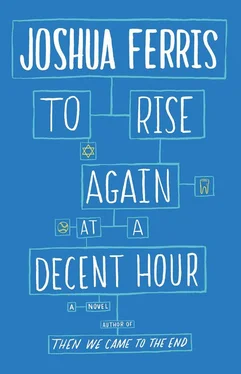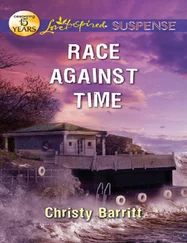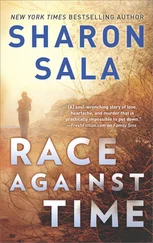“Sounds pretty,” said Wendy. “But maybe not the whole story.”
Stuart told me that Mirav abandoned Judaism, married a materials magnate, and was divorced after raising two children. Responding to an ever-growing urge, she changed her name back to Mendelsohn in 2007 and reentered the Orthodox community. She was now living at a Hasidic center and teaching traditional Jewish practices to female proselytes.
We arrived at a kind of campus or housing network, with synagogue, school, and dormitory, where those individuals committed to a new life as Orthodox Jews received instruction. Mirav was teaching a night class. The women concluded class by singing. We stood outside, waiting and listening. I will never forget that one unbroken song of shifting melody and tempo changes and the novices’ imperfect command of both, while one voice remained steady: a strong, joyous voice, a guiding and correcting voice, a voice glorying her Maker while leading those unsteady faltering voices, derailing and dying and devolving into laughter, to the ringing harmony of a pure instant or two. It was Mirav’s.
Once class was over, Wendy made introductions, and Mirav led us to a commons room. It smelled of old books and burnt coffee. The walls were adorned with a variety of Jewish folk art: playful illustrations of menorahs and dreidels, Hebrew letters trotting colorfully across Torah scrolls. There were bent figures at the Western Wall, roughly sketched; prayer shawls aswirl on magical gusts of wind; exultant feasts; dancing families. My favorite was an enormous paper cutout of Noah’s ark, laden with every animal, and a dragon, too, floating in what looked like a calm Caribbean Sea.
Mirav wore a silk head scarf patterned with paisley and a long black skirt. I found her to be open and forthright, speaking to us with earnest intent until she cast off that earnestness with an easy laugh. She gave me the impression of being a joyful person, not unaware of the shit and the misery and yet still joyful. I was always startled to encounter such people. I liked them instantly and all out of proportion to our acquaintanceship.
“Can I get anyone coffee?” she asked as we sat down.
We all declined.
“Thank you for agreeing to meet with us,” Stuart said. “I know you’ve done this already for Mr. Mercer, but would you mind doing it one more time, for my sake and for Paul’s?”
“Sure,” she said. “That should be easy enough.”
And with that she took us back to 1979.
Her uncle owned a small grocery in Los Angeles, in a neighborhood not far from her parents’ house. She would walk there in the afternoons to get things for her mother. On her way home one day, Grant Arthur came up to her and offered to carry her bags. He was dressed in bell-bottom jeans and the kind of shirt that only John Travolta wore. He asked her if she was Jewish. She said she was. He asked what that life was like, where she went to church, and if she minded not celebrating Christmas. She told him that her father was the rabbi at Shalom B’nai Israel and that Christmas was something she had cared about only as a little girl. He wanted to know if the Jews really ate so differently from Christians. What exactly did Jews eat?
“At first,” Mirav told me, Uncle Stuart, and Wendy Chu in the commons room, “I thought he might be mocking me. But he wasn’t. That boy, he was so guileless. So eager. He was really just so innocent.”
The next time she went to her uncle’s grocery, he came up to her the minute she left the store. She suspected that he was watching her, but she never knew how or from where. He told her that he had found a rabbi, Rabbi Youklus of Anshe Emes, who had agreed to oversee his conversion to Judaism. Rabbi Youklus was going to teach him everything there was to know. He had already learned about Shabbat, which happened every Saturday. That was a big difference between Judaism and Christianity, he said. Christians always worshipped on Sunday and never had a big meal the night before, unless it was a dinner party or a fund-raiser. Rabbi Youklus had promised to invite him over for Shabbat. Did she know by heart the blessings made when the candles were lit? And all the other blessings and songs? He said he liked, as he put it, “all those rituals and prayers and things” Jewish people were always doing. He couldn’t wait to sit inside the rabbi’s house and see how it was all done. She liked listening to him. He animated her everyday world, and it made her feel special for the first time. She was seventeen.
“It never occurred to me to ask which came first,” she said, speaking directly to me, “his interest in Judaism or his interest in me. I’m not sure it matters, even now — if I ‘inspired’ him, or however you want to put it. Deranged him!” She laughed with a lot of spontaneous heart. She turned to Stuart. “Isn’t that what we do when we fall in love, derange each other?” He smiled at her as I had never seen him smile, as if he, too, knew what it meant to be deranged by love. “But no, I never thought that Judaism was just a convenience for him—‘a way in.’ Or the other way around: that I was a convenience for whatever he was ultimately seeking. I think he saw me and he liked me, but I also think that he was in that neighborhood, that specific neighborhood, for a reason. He wanted to be a Jew.”
“I already know all this,” I said. “He told me himself.”
Mirav looked from me to Stuart. “Should I continue?”
“Please,” he said.
On one such trip from the grocery to her house, they took a detour so that they could continue talking. He said he didn’t know how anybody could be Jewish because of everything you had to know. You had to know the Bible. You had to know the Talmud. You had to know the laws — so many laws. You had to know the history. You had to know how to say the blessings and the prayers. And if you really wanted to do things right, you had to know Hebrew. He had thought Hebrew was just an old language the Bible had been written in, but the rabbi told him that Hebrew was the language of Israel, the language of the Jews. And then there was Yiddish. He asked Mirav if she knew Yiddish. He asked her what the difference between Yiddish and Hebrew was.
“They’re just two different languages,” she said.
“Do you see what I mean? You have to know two different languages and study the Old Testament and know all the holidays and how they started and why they’re important — that’s a lot.”
“You don’t have to know Yiddish,” she said.
“That’s okay, I’m going to learn it.” He pointed to a bungalow on the corner. “I live there,” he said.
It sat up on a little slope of lawn. Azaleas bloomed below the front windows. Flagstones rose from gate to door flanked by rows of tulips. It was a grown-up’s house.
“With your parents?” she asked.
“No.”
“With anyone?”
“No,” he said. “Just me.”
“How old are you?” she asked.
“Nineteen,” he said.
It would take her three months to gain the courage to walk there on her own and ring the bell. By then there would be a mezuzah by the door. In the meantime, there were more walks from the grocery, more detours, longer detours, questioning looks from her mother when she finally made it home. She knew not to utter a word. This was not the kind of boy they had in mind for her. Her father was only going to approve of someone born south of West Hollywood or north of Wilshire or on a kibbutz in Kinneret. She confided in her cousins, whose lies and complicity helped her keep him a secret for longer than anyone would have imagined.
“We were a close-knit community,” she said. “You could say closed off, or even closed minded. And look where I am now!” she said, and she laughed at herself. “Right back in it!” She laughed again. “But it was different then. You have to remember the times. A generation of shtetl Jews was still alive. They didn’t mingle with too many John Travoltas. They had that ‘once-a-goy-always-a-goy’ mentality that we no longer have, even here in Crown Heights. They didn’t know what to make of converts.”
Читать дальше












